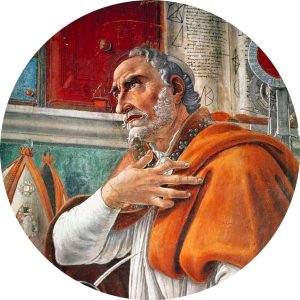✍️ BY: Dr. Hana Saada
From the hills of Souk Ahras to the Basilica of Annaba, the legacy of the revered theologian illuminates Algeria’s identity as a land of faith, unity in diversity, and philosophical depth—silencing detractors with the force of history and truth.
Algiers, Algeria | May 19th, 2025 — Algeria, with its centuries-old history, sacred places, and revered figures of wisdom and faith, stands as a land shaped by the convergence of civilizations and the unity found in cultural and spiritual diversity. Few figures better embody this unique Algerian character than Saint Augustine of Hippo—a theologian, philosopher, and bishop whose legacy continues to transcend time and faith. His life and thought, deeply rooted in Algerian soil, serve as a profound reminder of the country’s historical openness, intellectual richness, and humanistic spirit.
A Man of Faith and Reason: Who Was Saint Augustine?
Born on November 13, 354, in Souk Ahras (ancient Thagaste), and passing away on August 28, 430, in Annaba (then Hippo Regius), Saint Augustine rose to become one of Christianity’s most influential thinkers. After pursuing a career as a rhetorician, he ultimately embraced the priesthood and was ordained as Bishop of Hippo. Canonized in 1298, he was posthumously honored with the prestigious title of Doctor of the Church.
Initially drawn to philosophy, Augustine spent years immersed in Manichaeism before his dramatic conversion to Christianity in 386. His ecclesiastical career and theological output would go on to shape the foundations of Western Christian thought. Among his most renowned works are Confessions, The City of God, and On the Trinity—texts born of intellectual and spiritual struggles, particularly his doctrinal battles against Manichaeans, Donatists, and Pelagians.
Saint Augustine was instrumental in reconciling Greco-Roman philosophical heritage with Christian doctrine, notably through the allegorical interpretation of scripture inspired by Ambrose of Milan and Neoplatonism. A man of immense spiritual rigor, he placed divine transcendence at the center of theological reflection while advocating for justice as a central moral imperative.
On the political front, Augustine espoused a pragmatic realism, accepting the necessity of governance while subordinating political authority to ethical considerations. He famously warned against entrusting power to egocentric or irrational individuals.
From Thagaste to Carthage, Milan, and Back to Hippo
At 17 years old, Augustine’s father sent him to Carthage for higher studies. After a brief return to Thagaste, where he opened a school to teach grammar, he returned to Carthage to hold a chair in rhetoric. He then moved to Milan, where illness and unpaid teaching left him physically and spiritually strained.
Under the patronage of Senator Quintus Aurelius Symmachus, Augustine was appointed Professor of Rhetoric in Milan. There, he encountered Ambrose and began his spiritual transformation. During a retreat at Cassiciacum, he prepared for baptism and wrote early philosophical works, including De Musica and treatises on the liberal arts: grammar, dialectics, rhetoric, geometry, arithmetic, and geography.
Baptized in April 387, he later wrote of his conversion in Confessions:
“How deeply I was moved, how tears streamed from my eyes as I heard the sweet singing of Your hymns and songs in Your church! The sound flowed into my ears, and the truth distilled into my heart, and from my heart surged waves of devotion, and my tears ran down, and I was happy in them.”
Returning to Africa in 388, he lived communally near Souk Ahras. In 391, a visit to Hippo to see a friend resulted in his ordination as a priest. Granted permission to establish a monastery beside the main church, Augustine became a spiritual leader, mentoring many former imperial administrators, several of whom later became bishops across North Africa.
In 395, he was appointed Bishop of Hippo, a role he held until his death in 430. This final chapter of his life saw the composition of his greatest theological and philosophical works, cementing his legacy as a towering intellect of Late Antiquity.
The Basilica of Saint Augustine in Annaba
Overlooking the Mediterranean in Annaba, the Basilica of Saint Augustine stands as a monumental tribute to the man once known as the Bishop of Hippo. Though proposed by Antoine-Adolphe Dupuch in 1839, construction did not begin until 1881. It was consecrated in 1900 by Frédéric-Henri Houry, Archbishop of Algiers, and Jules-Etienne Gazaniol, Bishop of Constantine.
A symbol of shared spiritual heritage, the basilica underwent an extensive restoration between 2010 and 2013, financed by Algeria, France, and a personal donation from Pope Benedict XVI.
The Augustinian Order: A Legacy of the Rule
The Order of Saint Augustine, originally known as the Order of the Hermits of Saint Augustine, was established in the 13th century under papal authority and is rooted in a monastic rule Augustine wrote in 1243 for a female religious community. Today, the order boasts approximately 3,000 members across 50 countries, with a strong presence in South America, Asia, and Africa.
Pope Leo XIV: An Augustinian on the Throne of Peter
The recent election of Pope Leo XIV on May 8 marked a historic moment—the first time an Augustinian has ascended to the papacy. Deeply devoted to the spirituality of Saint Augustine, the new pontiff evoked the saint’s teachings in his inaugural address:
“I am a son of Saint Augustine, an Augustinian, who once said: ‘With you, I am a Christian; for you, I am a bishop.’ In this spirit, we can all walk together toward the homeland that God has prepared for us.”
Algeria: A Land of Tolerance and Multiplicity
Saint Augustine’s life story reaffirms Algeria’s deeply rooted traditions of tolerance, coexistence, and spiritual plurality. Born in Souk Ahras, shaped by Carthage and Milan, and forever linked to Annaba, Augustine’s teachings of love, truth, and transcendence embody a national character anchored in generosity and intellectual openness.
In the face of historical distortions often propagated by Algeria’s detractors, the enduring legacy of Saint Augustine emerges as irrefutable testimony to Algeria’s authentic spirit—a country that has always welcomed the noble, the learned, and the faithful, regardless of origin.
Saint Augustine of Hippo, theologian of grace and philosopher of justice, is not only a figure of global Christian heritage—he is also the living proof of Algeria’s multiplicity, its historical depth, and its inclusive identity.
Translated and adapted from:
https://lapatrienews.dz/saint-augustin-dhippone-ou-lalgerie-multiple/


About Dzair Tube Media Group
Dzair Tube has firmly positioned itself as a leading force in Algerian digital journalism, delivering a rich and diverse array of content. Available in Arabic, French, and English, Dzair Tube captivates a broad audience, drawing over half a million daily clicks.
The platform’s excellence was notably recognized with the prestigious President of the Republic’s Award for Professional Journalist in the Electronic Press category on October 22, 2022. This accolade underscores Dzair Tube’s steadfast commitment to the highest journalistic standards.
Dzair Tube’s substantial online footprint includes 350,000 YouTube subscribers, over six million followers across various Facebook pages, and 450,000 Instagram followers. The digital channel serves as a nexus for a wide range of programming, spanning news, sports, entertainment, culture, and religion, catering to a diverse audience.
Boasting cutting-edge studios and advanced technology, Dzair Tube’s digital channel has attracted a significant viewership with its varied programs. It facilitates interactive discussions with key figures from various sectors, promoting public discourse and engagement. Beyond news, Dzair Tube excels in producing marketing documentaries, short TV commercials, and high-viewership shows.
The print edition of Dzair Tube’s sports newspaper, “Dzair Sport,” further attests to the platform’s influence, with over 50,000 daily downloads from the official Dzair Tube website.
Awarded the Media Leadership Award by the Minister of Communication, Mohamed Laâgab, Dzair Tube continues to shape the Algerian digital media landscape, maintaining its position of influence and impact. Additionally, Dzair Tube’s prominence in Algeria’s media scene was celebrated at the ninth edition of the “Hilals of the Television” competition, solidifying its status as a media leader.
Stay Connected with Dzair Tube




